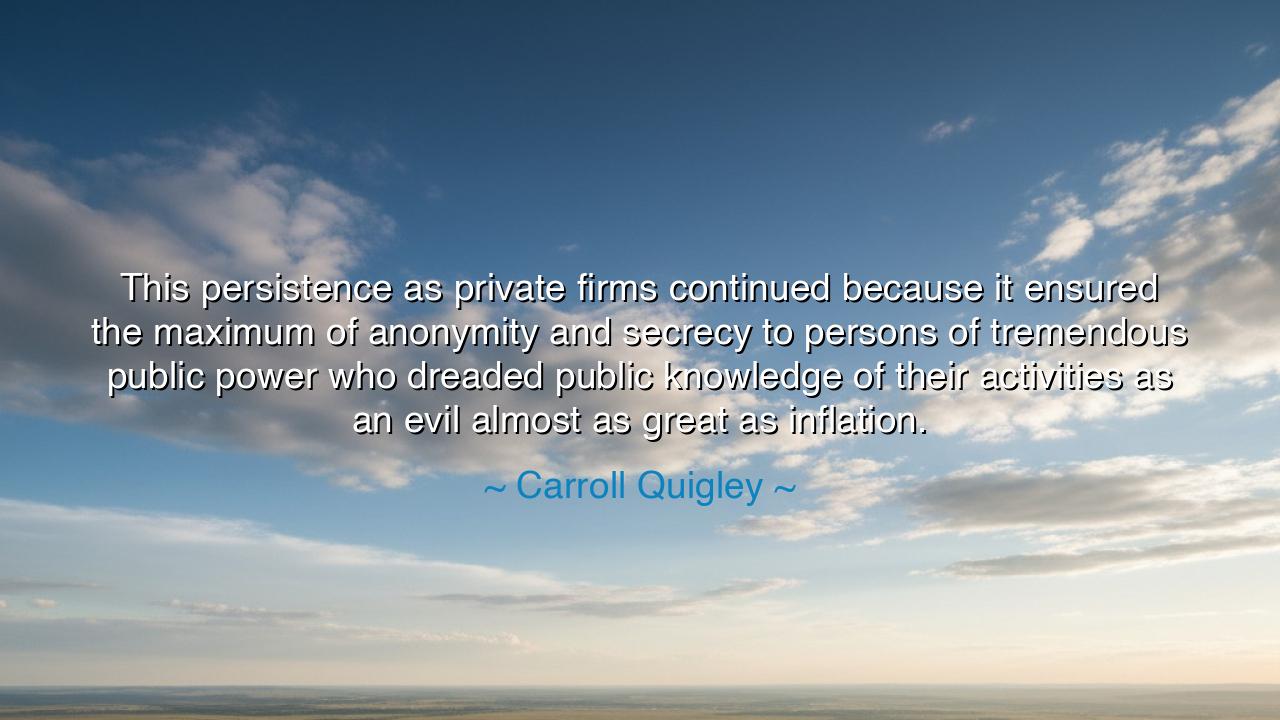
This persistence as private firms continued because it ensured
This persistence as private firms continued because it ensured the maximum of anonymity and secrecy to persons of tremendous public power who dreaded public knowledge of their activities as an evil almost as great as inflation.






“This persistence as private firms continued because it ensured the maximum of anonymity and secrecy to persons of tremendous public power who dreaded public knowledge of their activities as an evil almost as great as inflation.” — Carroll Quigley
In these dark and haunting words, Carroll Quigley, the historian and mentor to leaders, unveils a truth that pierces through the illusions of democracy and empire alike. He speaks of the hidden architecture of power, of the shadowed hands that move behind the curtains of politics and finance. His insight is not born of rumor, but of study — for Quigley, in his monumental works, especially Tragedy and Hope, examined the mechanisms by which private institutions came to wield influence greater than kings or parliaments. When he speaks of “private firms,” he does not mean simple merchants or traders, but the financial dynasties and secret networks that, through ownership and coordination, shaped the destinies of nations. His tone is not conspiratorial, but elegiac — the voice of one who has seen too much and knows that truth, once revealed, can disturb the peace of complacent men.
The origin of this quote lies in Quigley’s analysis of the global financial order that arose in the late nineteenth and early twentieth centuries. He traced how powerful banking families and financial houses — such as those of London and New York — created systems that appeared private, yet functioned as the hidden engines of governance. These entities preferred anonymity not because they feared crime, but because they feared exposure. To rule openly invites scrutiny; to rule invisibly ensures permanence. And so they operated not as public institutions, but as private firms, protected by secrecy and shielded by complexity. In this, Quigley reveals a paradox: those who possessed the greatest public power sought to appear as though they held none at all.
The ancients, too, knew of this invisible kind of rule. In the courts of Rome, the Senate often bowed not to the emperor’s will alone, but to the wealthy equites, the class of financiers and landowners whose gold controlled legions as effectively as Caesar’s sword. Cicero, in his time, warned that corruption often wears the mask of virtue, and that the republic dies not when its laws are broken, but when its guardians are bought. Quigley’s modern insight is but the echo of that ancient warning — that the hidden hand of power is more dangerous than tyranny, for tyranny is seen, and thus resisted, but secrecy commands without opposition.
Consider, as an example, the founding of the Federal Reserve in the United States — born not in the halls of Congress, but on Jekyll Island, where powerful financiers met in secret under false names to craft a system that would control the nation’s money. They acted in secrecy not to overthrow democracy, but to shield their influence from the light of public understanding. The system they built has endured for over a century — efficient, complex, and largely misunderstood by those it governs. Whether one sees this as wisdom or deceit depends on perspective, but Quigley saw in it a pattern: those who fear public knowledge fear accountability, and where there is no accountability, power corrupts the soul of nations.
What Quigley mourns in this quote is not simply the existence of power, but the loss of transparency — the slow decay of the public’s right to understand who truly governs their world. For when the strong act in secret, they rob the weak of the ability to act at all. A society in which decisions of destiny are made behind closed doors, under the cloak of private interest, becomes like a ship whose rudder is held by unseen hands — its passengers moving forward in ignorance, mistaking the current for freedom. And when the masses awaken too late, they find that the course was charted long ago, without their consent or knowledge.
Yet within his warning, Quigley offers a lesson for all generations. He calls us not to despair, but to discernment — to reclaim the ancient virtue of vigilance. Power, he teaches, must always be balanced by awareness; influence, always checked by inquiry. Citizens must demand light where there is shadow, must learn not only what their leaders say, but who whispers behind them. For knowledge, though slow, is the eternal antidote to control. The powerful dread exposure not because it destroys them, but because it reveals them, and revelation is the first step toward justice.
Let this, then, be the lesson passed down to all who seek truth in an age of deception: never mistake secrecy for wisdom, nor complexity for virtue. The machinery of power often hides behind the language of stability, but the health of a nation depends on the courage of its people to ask — who benefits? who decides? who hides? In every age, there are those who dread the public’s awakening, who tremble before the light of truth. But history favors those who seek that light — those who refuse to be governed by the unseen.
So, O seeker of wisdom, remember Carroll Quigley’s warning. The world is often ruled by hands that leave no fingerprints, by voices that speak through others. Do not be deceived by appearances; do not trade awareness for comfort. For while secrecy may protect the powerful, it is truth that preserves the free. And when knowledge shines upon the hidden corridors of influence, the chains of deception dissolve, and the people — at last — can see the path of their own destiny.






AAdministratorAdministrator
Welcome, honored guests. Please leave a comment, we will respond soon